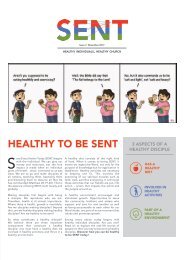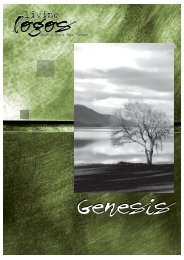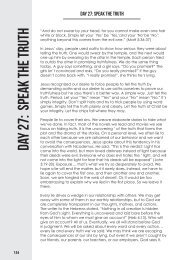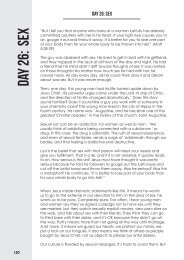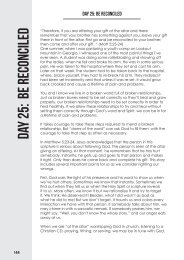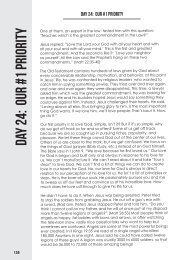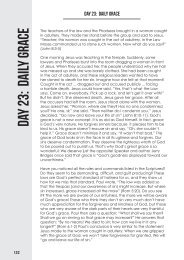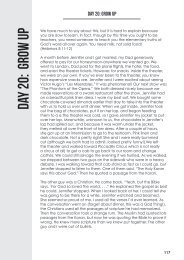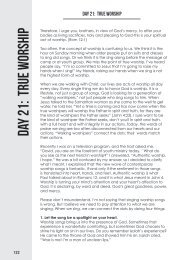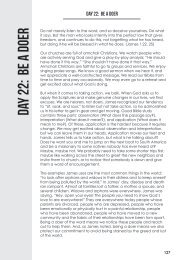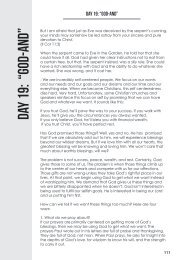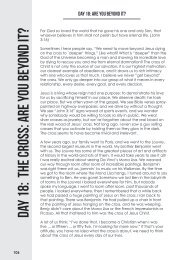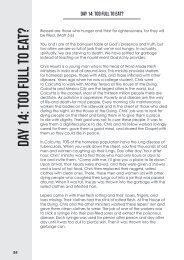Old Testament 1 Lesson 3
Old Testament 1 Lesson 3.pdf
Old Testament 1 Lesson 3.pdf
You also want an ePaper? Increase the reach of your titles
YUMPU automatically turns print PDFs into web optimized ePapers that Google loves.
Acknowledgments<br />
Living Logos was the heart-work of Bro<br />
Dale Starks and Sis Josephine Starks,<br />
missionaries to Singapore in the early<br />
1980s. As the original authors of this<br />
devotionals, the Starks meant for<br />
these self-study materials to help new converts<br />
(and matured saints alike) get a hold of an<br />
understanding of God’s written Word. Since Sis<br />
Stark’s passing in 2013, the couple had graciously<br />
entrusted Tabernacle of Joy with its copyright.<br />
Therefore, with every print run, we would like to<br />
honour their life work and sacrifice in bringing the<br />
gospel to Singapore. This copy is an updated and<br />
revised version. Be blessed as you immerse yourself<br />
in the Word and allow God to transform you into<br />
the likeness of Jesus Christ.<br />
1
<strong>Lesson</strong><br />
Three<br />
<strong>Old</strong> <strong>Testament</strong> 1<br />
<strong>Old</strong> <strong>Testament</strong> 1<br />
ISRAEL BEGINS TO CLAIM THEIR INHERITANCE<br />
As the children of Israel continued their journey towards the<br />
promised land, they were again forced to go miles out of the<br />
way. Balak, king of Moab, refused to give them permission to<br />
travel through his country, so they had to travel around the<br />
outskirts of it. God had already warned Moses:<br />
...Distress not the Moabites, neither contend with them in battle:<br />
for I will not give thee of their land for a possession; because I<br />
have given Ar unto the children of Lot for a possession<br />
— Deuteronomy 2:9<br />
Finally, they came to the country of the Amorites. These<br />
people controlled a large piece of territory on both sides of the<br />
Jordan River. To cross the River of Jordan and enter the land<br />
of Canaan, it was impossible to avoid a direct route through<br />
their land. However, Sihon, king of the Amorites, refused to<br />
give way. He came with his armies and fought against Israel,<br />
but was soundly defeated. After the battle, Israel possessed the<br />
land of the Amorites from the Arnon River unto the Jabbok<br />
River (Numbers 21:21-24).<br />
Moses then took the offensive. He first fought and defeated<br />
Jaazer, taking the villages thereof. His next battle was no easy<br />
matter. Og, the king of Bashan, was the last of a race of giants,<br />
measuring perhaps thirteen feet tall. (His bed was 13-1/2 feet<br />
long, and six feet wide). Many cities were fenced with high<br />
walls, gates and bars (Deuteronomy 3:5-11). Nevertheless, God<br />
gave Israel a mighty victory over this man and his armies, and<br />
Israel possessed the land of Bashan (Numbers 21:32-35).<br />
After their battle with Og, the children of Israel set up their<br />
camp in the plains of Moab, across the Jordan River from the<br />
imposing city of Jericho. Balak, king of Moab, had no reason<br />
to be afraid of Israel. They had passed peacefully around his<br />
land after he had refused them entrance. Despite the name of<br />
23
the place where Israel was encamped, it was not a part of Balak’s territory.<br />
Nevertheless, he obviously felt that the children of Israel were too close for<br />
comfort. They were close enough that from one particular mountain viewpoint<br />
he could see them stretched out across the plains by the thousands!<br />
They had just conquered the mighty giant Og. Perhaps their next plans were<br />
to fight against Moab. It was often the practice in those days, before one nation<br />
would fight against another, to hire divines (soothsayers) to pronounce<br />
a curse upon their enemy. In the country of Mesopotamia, the city of Pethor<br />
was a noted center for diviners, and a man by the name of Balaam was especially<br />
known for his enchantments.<br />
Balak had heard of the fame of Balaam, especially that whoever he blessed<br />
was blessed, and whoever he cursed was cursed. He sent the elders of Moab<br />
and Midian to Balaam, with the normal diviner’s fee, and a request for<br />
Balaam to come and curse the children of Israel. Although Balaam was not<br />
an Israelite, he did have knowledge of their God. He knew of the victories<br />
Israel had won, and in those days that was the test of the greatness of a<br />
nation’s gods. He was afraid to use his normal enchantments, and instead<br />
waited for the LORD to give him direction. He told the messengers who<br />
had come to get him to spend the night in the city, and the next morning<br />
he would give them his answer (Numbers 22:1-8).<br />
That night God spoke to him and said, “Thou shalt not go with them;<br />
thou shalt not curse the people: for they are blessed” (Numbers 22:12).<br />
These men returned home, but Balak would not give up. He “sent yet again<br />
princes, more, and more honourable than they” (Numbers 22:15). Balaam<br />
was promised great honour and wealth if he would come, but he answered:<br />
...If Balak would give me his house full of silver and gold, I cannot go beyond<br />
the word of the LORD my God, to do less or more<br />
— numbers 22:18<br />
Despite this answer, Balaam showed that he was beginning to weaken. He<br />
invited the men to “tarry ye also here this night, that I may know what the<br />
LORD will say unto me more.” He was probably hoping that the LORD<br />
would change His mind.<br />
God was not pleased with Balaam’s hesitation to send them away. This time<br />
He told Balaam to go with the men, because He wanted to teach him a lesson<br />
concerning the true God of Israel. He also ordered Balaam “the word<br />
which I shall say unto thee, that shalt thou do” (Numbers 22:20).<br />
24
The next morning he rose, saddled his donkey, and went with the princes<br />
of Moab. But somewhere along the journey the angel of the LORD stood in<br />
the way, with a drawn sword, as an adversary against him. Because of this,<br />
the donkey turned out of the way and went into the field. Balaam was furious,<br />
and smote the donkey. But the angel of the LORD blocked the path<br />
between two walls in the vineyard. In trying to avoid the angel, the donkey<br />
crushed Balaam’s feet against the wall, and Balaam smote his donkey again.<br />
When this happened yet another time, the LORD opened the mouth of<br />
the donkey, and she said unto him, “What have I done unto thee, that thou<br />
hast smitten me these three times.” Then the Lord opened Balaam’s eyes,<br />
and he saw the angel of the LORD with the drawn sword.<br />
And Balaam said unto the angel of the LORD, I have sinned; for I knew not that<br />
thou stoodest in the way against me: now therefore, if it displease thee, I will get<br />
me back again<br />
— numbers 22:34<br />
However, the angel of the LORD ordered Balaam to continue with the men<br />
but only speak the word that the LORD would give. The next day Balak<br />
took Balaam with him up into the high places of Baal, a place where he<br />
could see all the children of Israel encamped in the plains of Moab (Numbers<br />
22:41). Balaam had Balak build seven altars and prepare seven oxen<br />
and seven rams for sacrifice. Then, Balak and Balaam offered a ram and<br />
a bullock on each altar, and Balaam went up into a high place to wait for<br />
an answer from God. After God “put a word in Balaam’s mouth,” Balaam<br />
returned to Balak, and said:<br />
...Balak the king of Moab hath brought me from Aram, out of the mountains<br />
of the east, saying, Come, curse me Jacob, and come, defy Israel. How shall I<br />
curse, whom God hath not cursed? or how shall I defy, whom the LORD hath<br />
not defied. For from the top of the rocks I see him: and from the hills I behold<br />
him: lo, the people shall dwell alone, and shall not be reckoned among the<br />
nations. Who can count the dust of Jacob, and the number of the fourth part of<br />
Israel? Let me die the death of the righteous, and let my last end be like his!<br />
— numbers 23:7-10<br />
Balak was very angry, because Balaam had blessed Israel, instead of cursing<br />
them. But he was not ready to give up yet! He took Balaam to another place<br />
where he could only see a portion of Israel and requested again that Balaam<br />
curse Israel. Again, altars were built and sacrifices were offered. This time<br />
the word of the LORD came to Balaam, and he said:<br />
25
...Rise up, Balak, and hear; hearken unto me, thou son of Zippor: God is not a<br />
man that he should lie; neither the son of man, that he should repent: hath he<br />
said, and shall he not do it? or hath he spoken, and shall he not make it good?<br />
Behold, I have received commandment to bless: and he hath blessed; and I<br />
cannot reverse it. He hath not beheld iniquity in Jacob, neither hath he seen<br />
perverseness in Israel: the LORD his God is with him, and the shout of a king is<br />
among them.<br />
God brought them out of Egypt; he hath as it were the strength of an unicorn.<br />
Surely there is no enchantment against Jacob, neither is there any divination<br />
against Israel: according to this time it shall be said of Jacob and of Israel, What<br />
hath God wrought!<br />
Behold, the people shall rise up as a great lion, and lift up himself as a young<br />
lion: he shall not lie down until he eat of the prey, and drink the blood of the<br />
slain<br />
— numbers 23:18-24<br />
Of course, Balak was not happy at all with yet another blessing upon Israel.<br />
He cried out, “Neither curse them at all, nor bless them at all.” But in his<br />
stubbornness, he took Balaam to the top of Peor. Again, seven altars were<br />
built and sacrifices were offered. This time Balaam chose not to seek for<br />
enchantments, but seeing that it pleased the LORD to bless Israel, he set<br />
his face, toward the wilderness and began to do just that. A part of what he<br />
spoke is given here:<br />
“How goodly are thy tents, O Jacob, and thy tabernacles, O Israel! As the valleys<br />
are they spread forth, as gardens by the river’s side, as the trees of lign aloes<br />
which the LORD hath planted, and as cedar trees beside the waters. He shall<br />
pour the water out of his buckets, and his seed shall be in many waters, and his<br />
king shall be higher than Agag, and his kingdom shall be exalted<br />
— numbers 24:5-7<br />
This time Balak was so angry that he smote his hands together and said<br />
to Balaam, “I called thee to curse mine enemies, and, behold, thou hast altogether<br />
blessed them these three times.” Then, he ordered Balaam to return<br />
home, but before Balaam returned, he fell into a trance and began to make<br />
prophetic utterances, including this one concerning the Messiah:<br />
I shall see him, but not now: I shall behold him, but not nigh: there shall come a<br />
Star out of Jacob, and a Sceptre shall rise out of Israel...<br />
— numbers 24:17<br />
26
Although Balaam did not curse Israel, he did give counsel to Balak how<br />
Israel could be defeated, by causing them to fall into immorality and<br />
idolatry (Numbers 31:16; 25:18; Revelation 2:14). Many of the women of<br />
the Moabites first lured many of the men of Israel into committing sexual<br />
sin with them, and then led them into the worship of Baal-peor, a Moabite<br />
deity.<br />
There is an important spiritual truth in this lesson. Satan can never rob us<br />
of the blessings of God. He has no power to bring about any curse upon our<br />
lives, or to keep us from living for God.<br />
Nothing but our own sins can keep us from receiving the promises and the<br />
blessings of God given to all true believers. In other words, nothing can really<br />
defeat us - except our own sins!<br />
Let no man say when he is tempted, I am tempted of God: for God cannot be<br />
tempted with evil, neither tempteth he any man: But every man is tempted, when<br />
he is drawn away of his own lust, and enticed. Then when lust hath conceived, it<br />
bringeth forth sin: and sin, when it is finished, bringeth forth death<br />
— James 1:13-15<br />
Balaam was a fortune teller, and thus normally operated by satanic power.<br />
Yet he could not hinder the people of God with this power. God turned<br />
all of the cursing into blessings. We are the people of the covenant. The<br />
promises and blessings of God belong to us, and there is nothing Satan can<br />
do to take them away from us. However, if we yield to temptation, and do<br />
not quickly repent and turn from our sins, we disinherit ourselves from the<br />
things that God has promised to them who love Him.<br />
God was so angry because many of the men of Israel became worshippers of<br />
Baal-peor that He commanded Moses:<br />
...Take all the heads of the people, and hang them up before the LORD against<br />
the sun, that the fierce anger of the LORD may be turned away from Israel<br />
— numbers 25:4<br />
Moses commanded the judges to slay all the men who had joined themselves<br />
to Baal-peor. One of the children of Israel brought a Midianitish<br />
woman unto his brethren in the sight of Moses and the entire congregation,<br />
who had gathered weeping at the door of the tabernacle of the congregation.<br />
When Phinehas, the grandson of Aaron, saw it, he rose up, and took<br />
a javelin in his hand and went into the tent where the man and woman<br />
were, and killed them. This act stopped the plague that had come upon the<br />
children of Israel, killing 24,000 of them (Numbers 25:5-9).<br />
27
Phinehas was commended by the Lord for this act, and God gave him His<br />
“covenant of peace...even the covenant of an everlasting priesthood; because<br />
he was zealous for his God, and made an atonement for the children of<br />
Israel” (Numbers 25:10-13).<br />
JOSHUA APPOINTED AS THE NEW LEADER<br />
As the death of Moses drew near, God began to talk to Moses concerning<br />
the future. Moses was concerned that the right man takes over as his replacement.<br />
He prayed that “the LORD, the God of the spirits of all flesh”, would<br />
“set a man over the congregation” so that Israel would not be “as sheep<br />
which have no shepherd” (Numbers 27:16-17).<br />
God told Moses to take Joshua, “a man in whom is the spirit,” and lay his<br />
hand upon him, and give him a charge before the priest and the entire<br />
congregation. He was also to put some of his honour upon him, so that the<br />
children of Israel would follow him (Numbers 27:18-20).<br />
And he gave Joshua the son of Nun a charge, and said, Be strong and of a good<br />
courage: for thou shalt bring the children of Israel into the land which I sware<br />
unto them: and I will be with thee<br />
— Deuteronomy 31:23<br />
Before Moses died, God gave him a song, and told him to teach it to the<br />
children of Israel. It was a song about God’s greatness, all He had done for<br />
Israel - and yet they still forgot their God! It warned of judgements to come.<br />
It was a reminder that the LORD was the only true God.<br />
God knew that when they prospered in Canaan, they would forget Him,<br />
and this song was to be a testimony against them. Then when troubles came<br />
their way, they would remember the words of the song (Deuteronomy 31:19-<br />
30; 32:1-44).<br />
MOSES’ DEATH<br />
The same day that Moses taught the song to Israel, God spoke to him:<br />
Get thee up into this mountain Abarim, unto Mount Nebo, which is in the land<br />
of Moab, that is over against Jericho; and behold the land of Canaan, which I<br />
give unto the children of Israel for a possession: And die in the mount whither<br />
thou goest up, and be gathered unto thy people; as Aaron thy brother died in<br />
mount Hor, and was gathered unto his people<br />
— Deuteronomy 32:49-50<br />
28
Although Moses was not allowed to enter into the promised land of Canaan<br />
because of his disobedience in smiting the rock, he was allowed to view the<br />
promised land from Mount Nebo, before his death (Deuteronomy 34:1-4).<br />
Let the student remember that Canaan is a type of the spiritual kingdom of<br />
God, the church of Jesus Christ.<br />
1. Moses, as a type of the Law, couLd not enter the proMised Land:<br />
The law and the prophets were until John: since that time the kingdom of God<br />
is preached, and every man presseth into it<br />
— Luke 16:16<br />
2. Moses and aLL the patriarchs and prophets desired to be a part of<br />
the spirituaL canaan, and they did see it “froM afar off”, but were<br />
not perMitted to be partakers of it:<br />
These all died in faith, not having received the promises, but having seen them<br />
afar off, and were persuaded of them...<br />
And these all, having obtained a good report through faith, received not the<br />
promise: God having provided some better thing for us, that they without us<br />
should not be made perfect<br />
— hebrews 11:13, 39<br />
We are privileged above all <strong>Old</strong> <strong>Testament</strong> believers, because we have that<br />
“better thing” - the personal presence of Jesus Christ in our lives through<br />
the baptism of the Holy Spirit.<br />
Shortly before Moses’ death, he did several things:<br />
1. He gathered the children of Israel together, and pronounced a blessing<br />
upon all twelve tribes.<br />
2. He gathered all his writings together, and gave them to the Levites.<br />
They were told to keep them in the ark of the covenant for a witness<br />
against Israel. This includes the books of Genesis, Exodus, Leviticus,<br />
Numbers and most of the book of Deuteronomy (Deuteronomy 31:24-<br />
26). Ezra, the scribe, is said to have finished the book of Deuteronomy,<br />
which gives the final account of Moses’ death.<br />
So Moses the servant of the LORD died there in the land of Moab, according<br />
to the word of the LORD. And he buried him in a valley in the land of Moab,<br />
29
over against Beth-peor: but no man knoweth of his sepulchre unto this day. And<br />
Moses was an hundred and twenty years old when he died: his eye was not dim,<br />
nor his natural force (strength) abated<br />
— Deuteronomy 34:5-7<br />
Moses died alone with God, and had the rare privilege of being buried by<br />
God - in a place not know to any human being. If Israel had known his<br />
burial place, they would have made it a religious shrine, and perhaps even<br />
worshipped it. This is probably the reason God let Moses die away from the<br />
people.<br />
The children of Israel mourned for Moses thirty days, as they had also done<br />
for Aaron.<br />
And there arose not a prophet since in Israel like unto Moses, whom the LORD<br />
knew face to face<br />
— Deuteronomy 34:10<br />
VOCABULARY<br />
adamant —<br />
not giving in, unyielding<br />
enchantments —<br />
imposing —<br />
offensive —<br />
outskirts —<br />
sepulchre —<br />
shrine —<br />
magic spells, or charms<br />
impressive in size, looks, etc.<br />
attitude or position of attack<br />
the outer areas<br />
a vault or chamber for burial<br />
a place in which devotion or worship is given to a<br />
saint or deity<br />
30
<strong>Old</strong><br />
<strong>Lesson</strong><br />
<strong>Testament</strong><br />
ree<br />
1<br />
Test<br />
1<br />
2<br />
3<br />
4<br />
5<br />
6<br />
7<br />
8<br />
9<br />
10<br />
11<br />
Why was Israel’s battle with Og no easy matter?<br />
__________________________________________________________<br />
_________________________________________________________.<br />
What land was Og king over?<br />
_________________________________________________________.<br />
Who did Balak hire to curse Israel?<br />
_________________________________________________________.<br />
What was Balaam’s first answer to Balak?<br />
__________________________________________________________<br />
_________________________________________________________.<br />
Why did the donkey turn out of the path and go into the field?<br />
__________________________________________________________<br />
_________________________________________________________.<br />
What did the donkey do after Balaam hit him the third time?<br />
__________________________________________________________<br />
_________________________________________________________.<br />
Did Balaam curse Israel?<br />
_________________________________________________________.<br />
What did Balak finally tell Balaam?<br />
__________________________________________________________<br />
_________________________________________________________.<br />
Did Moses choose Joshua to be his replacement? __________________.<br />
What was Moses commanded to do so that the people would honour<br />
Joshua as their new leader?<br />
__________________________________________________________<br />
_________________________________________________________.<br />
What was the message of the song that Moses wrote and taught Israel?<br />
__________________________________________________________<br />
_________________________________________________________.<br />
31
12<br />
13<br />
14<br />
15-16<br />
Why was Moses not permitted to enter in the land of Canaan?<br />
__________________________________________________________<br />
_________________________________________________________.<br />
How did the <strong>Old</strong> <strong>Testament</strong> believers obtain a good report (Hebrews<br />
11:13, 39)?<br />
__________________________________________________________<br />
_________________________________________________________.<br />
Why are we privileged above all <strong>Old</strong> <strong>Testament</strong> believers?<br />
__________________________________________________________<br />
_________________________________________________________.<br />
List two things Moses did before his death:<br />
17<br />
18<br />
19<br />
20<br />
Who buried Moses? __________________________.<br />
For what reason did God not allow the children of Israel to bury Moses?<br />
__________________________________________________________<br />
_________________________________________________________.<br />
How old was he, and what was the condition of his health upon his<br />
death? ____________________________________________________<br />
_________________________________________________________.<br />
What did you find of special interest to you in this lesson?<br />
32
205 Henderson Road, #07-01<br />
Henderson Industrial Park, S159549<br />
Tel: 63344022 Email: contactus@tabjoy.org<br />
Website: www.tabjoy.org




